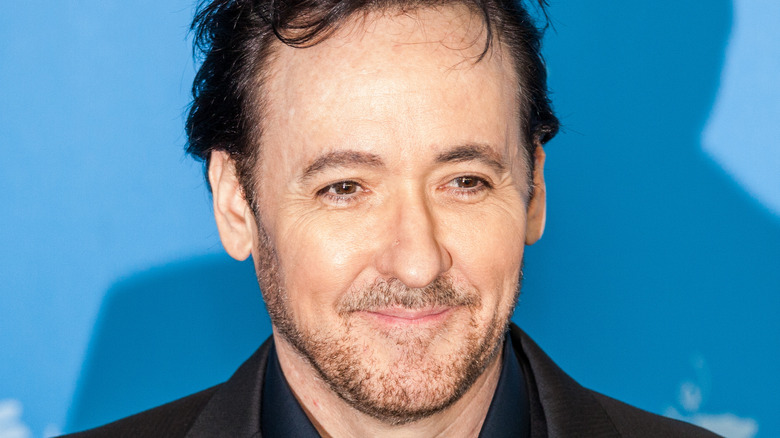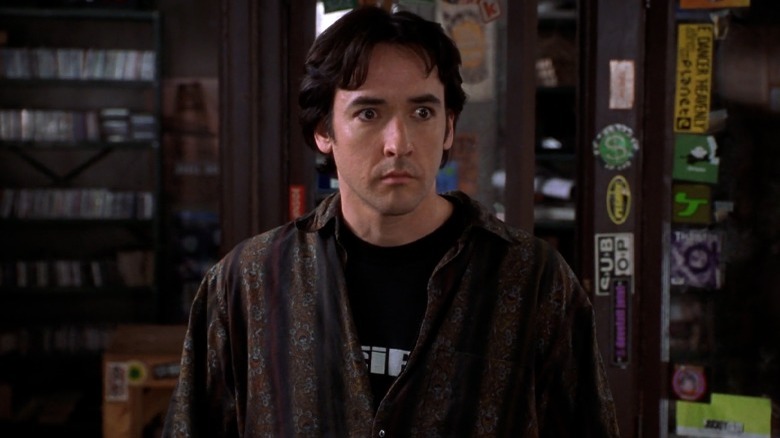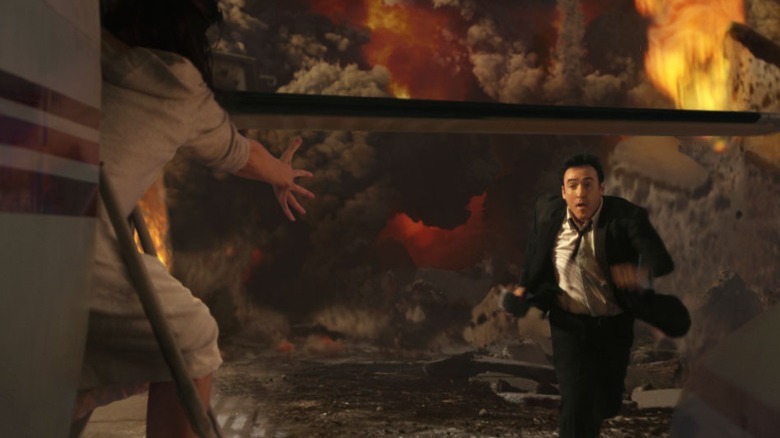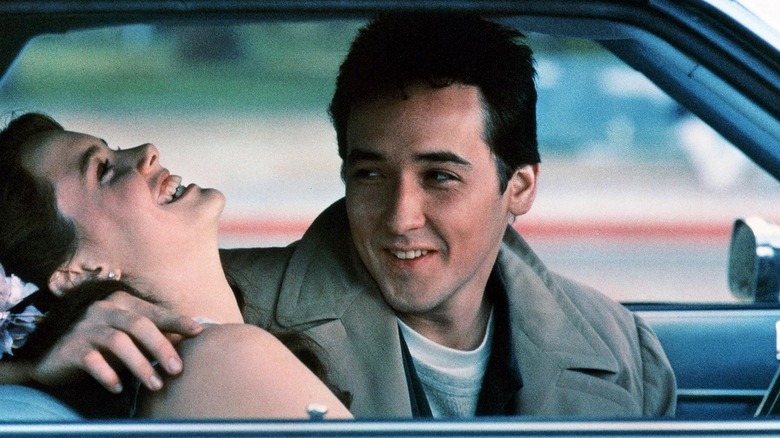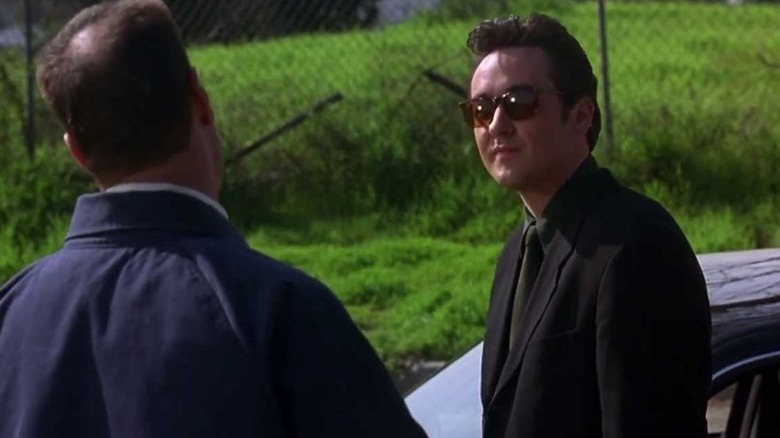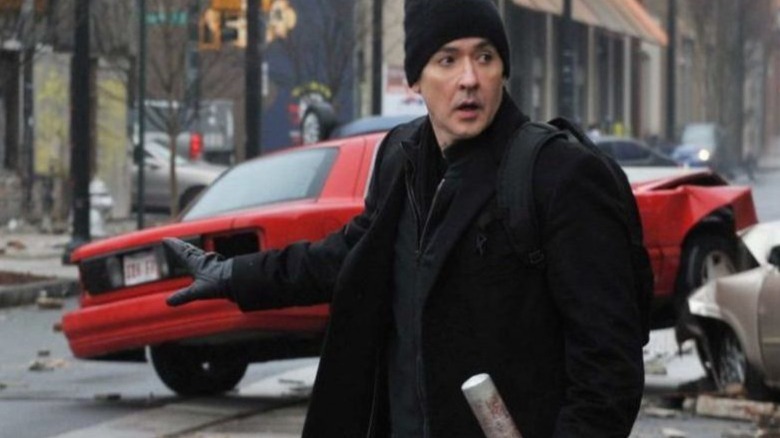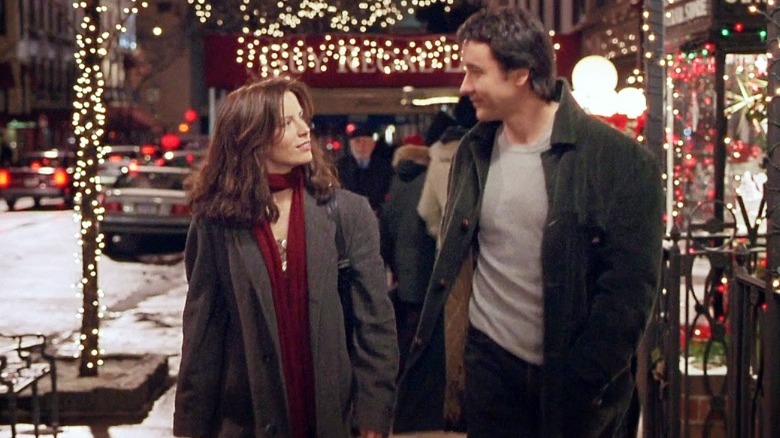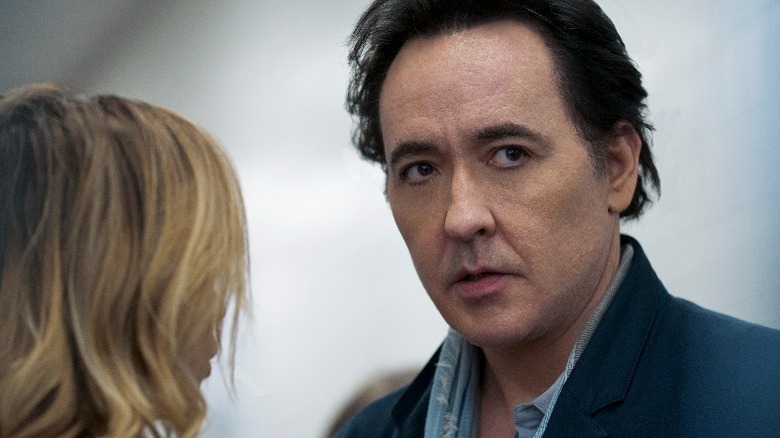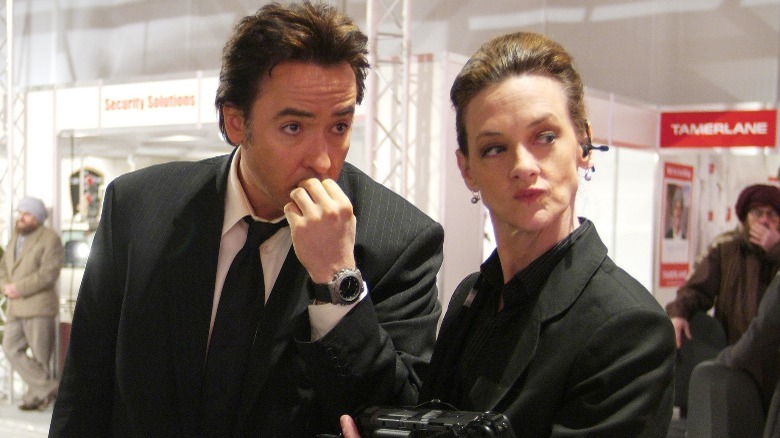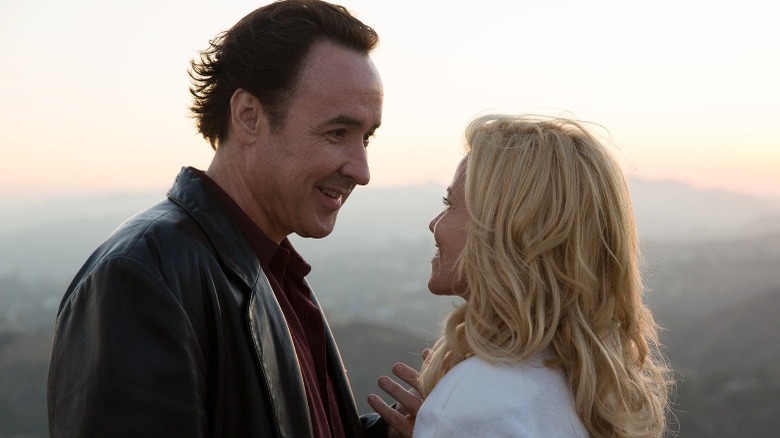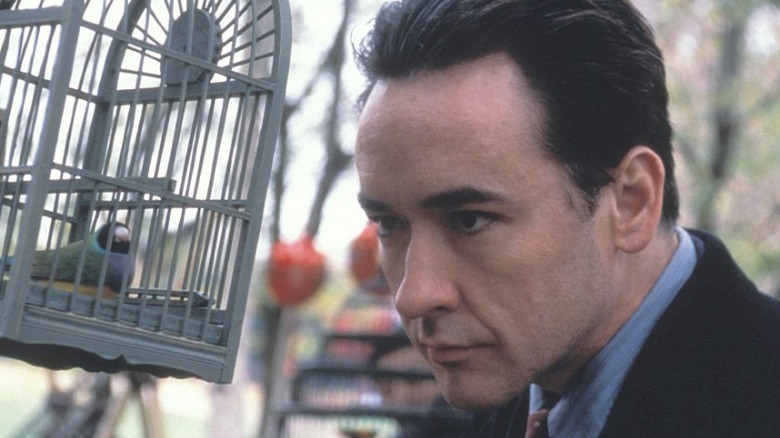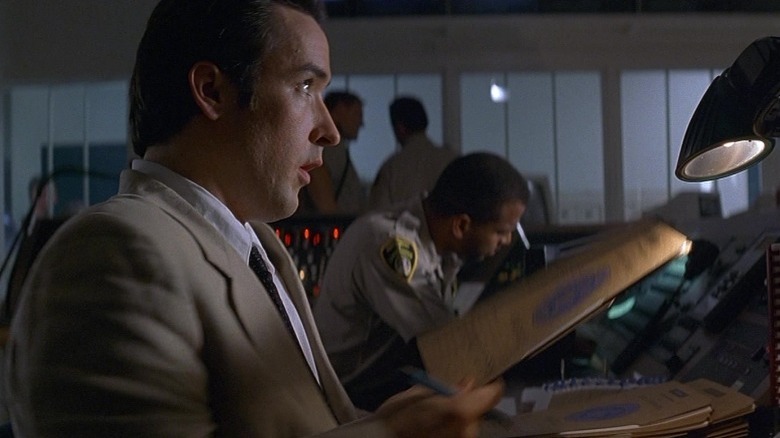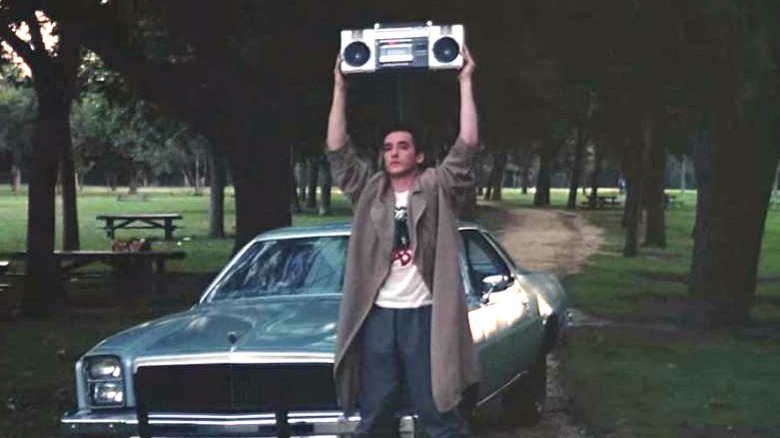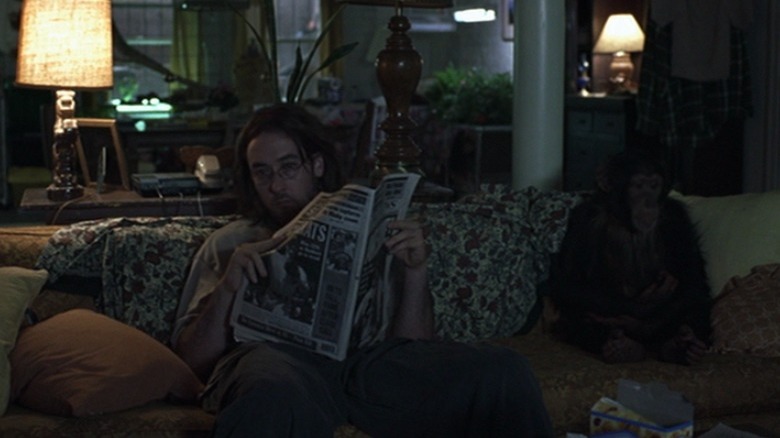The Untold Truth Of John Cusack
John Cusack is not a big fan of present-day Hollywood. They don't make 'em like they used to, according to Cusack, who says that Hollywood was more likely to take risks on independent directors in the late 20th century — as he told 614, that's his celebrated work in films like "Grosse Pointe Blank" and "High Fidelity" ever came to be. Now, Cusack argues, studio executives are only concerned with what sells. "There is no Hollywood any more," he insisted in an interview with The Guardian. "There's just a bunch of banks."
Of course, Cusack is well aware of the irony of his situation. As a Hollywood star who distrusts Hollywood, he acknowledges that you will inevitably need to participate in the system if you want a chance to create art. "You don't take it seriously, but you have to be in it," he told Female.com.au.
Let's take a closer look at some facts you probably didn't know about this reluctant star of Hollywood.
Cusack likes getting into the minds of despicable characters
There's a reason Cusack is so good at playing bad guys — he actually enjoys getting into that headspace. "You want the characters to be better than you, so you can learn something from them," Cusack told GQ. "And if they're much worse than you, you can learn something, too."
From the war-profiteering assassin from "War, Inc." to the manipulative puppeteer from "Being John Malkovich," Cusack has starred in countless movies where viewers are likely rooting against the hero. He summed it up perfectly in an interview with The Guardian: "My characters often know it's wrong but do it anyway."
When The New York Times suggested that maybe Cusack's character from "High Fidelity" might embody a form of toxic masculinity, Cusack wholeheartedly agreed, saying, "If somebody was writing that Rob was a passive-aggressive womanizer, I'd be like, 'All right, somebody got it.'" He was hoping viewers would pick up on Rob's flaws and did not feel the need to sanitize Rob or make his character a more decent person; instead, he felt it was more important that he portrayed a realistic character than a likable one in the film.
Cusack also explained that when he plays antiheroes, he tries to understand how they see the world. For instance, he decided that Martin Blank, the assassin from "Grosse Pointe Blank," became a killer because he figured that was the only way to get ahead in his pursuit of the American Dream. "Like, a killer's a bad thing, right?" he told the Times. "But we could all be that person."
He feels like a big budget can be a blessing and a curse
Despite his distrust of present-day Hollywood, Cusack (like many actors) understands that you will still need to play the game in Hollywood if you want to make any movies. "I'm a pretty lucky person, being able to be making art, and being paid to do it," he told Female.com.au. So he's thankful whenever he can land a role, whether it's a small-budget affair or a summer blockbuster. He added that it can be "flattering" whenever he is approached by a major studio for a job, though he's still a bit wary of the strings that come attached to any big-budget film. According to Cusack, the more money a studio pours into a film, the more it's going to expect that film to make a profit — which means more studio interference, less creative risks, and more "[watered] down impulses," as he put it to The New York Times.
Cusack also told the Times that it's not just the studio executives who are led astray by the temptation of money, either; creatives can get sucked in, too. The actor recalled working on the 1996 suspense drama "City Hall" and claimed the director (Harold Becker) spent two days shooting a brief scene in a train station that required only two lines of dialogue. When the director still wasn't happy with the shot, he rebuilt the whole train station on a soundstage just for that shot — simply because he could — leaving Cusack to surmise, "This is madness."
Sometimes Cusack disregards instructions and does his own thing
Cusack doesn't always do as he's told. Sometimes he is even willing to go against the director's wishes if his gut tells him that his character would act differently. "They want you to be a straight leading man," he told The New York Times, "but your instinct is to do weirder stuff."
Once he challenged what screenwriter Jim Brooks was saying about his character from "Say Anything." In an interview with The Current, Cusack said he was convinced that Lloyd Dobler "didn't have enough dimension" the way he was written. Cusack felt that the current version of the script didn't put enough thought into Lloyd's personal views; he wanted to know more about Lloyd's life outside of his role in the plot.
As Cusack recalled to the Times, Brooks told him, "Look, buddy, I don't think this is a guy that has an agenda. I don't think this is a kid who needs a beer to have fun." The way Cusack recounted the story, he practically cut off Brooks mid-sentence and told Brooks, "Lloyd totally has an agenda. He totally thinks about the world. He's this Army-brat kid listening to the Clash." Luckily, Brook didn't take offense, and he incorporated Cusack's insight about Lloyd into the final movie. In fact, for one scene Lloyd is actually wearing a Clash T-Shirt.
When writing and producing, Cusack gives his actors free reign
After Cusack finally got the chance to helm his own projects as a producer and writer, he made sure never to forget what it was like to be an actor who wanted to contribute his own ideas to the movie. So as a producer, he trusted his actors and left them plenty of room for improvisation.
For the first movie that he wrote and produced — "Grosse Pointe Blank" — Cusack only wrote about three-quarters of the script before he brought his actors on. "You wanna sort of get the script pregnant, but not fully done," he told GQ. That's because he knew he would be working with great comic actors like Dan Aykroyd and Minnie Driver, who were excellent at improv and bound to have their own ideas to add to the story. So Cusack stepped back and let these actors do what they did best. At one point, Alan Arkin requested to do a last-minute rewrite of a scene, which made a handful of studio execs mighty uncomfortable. According to Cusack, he assured them, saying "Don't worry. That's Alan Arkin. Anything he's gonna do is gonna make this thing even better."
This is especially true of whenever he gets to work with his sister Joan Cusack. In an interview with CBR, he said, "I basically write some stuff on the page and get on set, and then she says whatever the f*** she wants," because Joan is just that good.
He thinks some movie editors have a heavy hand
Another thing Cusack is not a fan of is heavy-handed film editing. All too often a film "gets butchered in the editing room," he told The Guardian. In his experience, most of the films that he's worked on seem to lose something important somewhere between the director's cut and the final version — he estimates nearly 90% of them — and it depresses him that "only one in 10 movies that you're making work out the way they were planned."
For example, he remembers that when he was working on "Cell," a 2016 adaptation of the Stephen King novel of the same name, a studio executive kept giving the film crew feedback that made absolutely no sense to him. "It seemed to me that he hadn't read the book," John insisted in an interview with The New York Times. According to Cusack, the studio exec kept asking, "Why are you putting these things in the movie?" Understandably, Cusack was miffed by the question because the filmmakers hadn't inserted those details on a whim — the details had come straight from the original book. And when you're borrowing from the work of someone as talented as King, you don't break from the source material without a good reason.
Although he's well-known for his romcoms, Cusack doesn't like them much
Cusack has played plenty of leading men in romantic comedies such as "Say Anything" and "High Fidelity," but it's not his preferred genre of entertainment. When The New York Times suggested that Cusack's name became synonymous with romcoms at the turn of the century, Cusack replied, "That's not really my genre or the kind of thing that I like." He pointed out that he signed up for "America's Sweethearts" because he knew director Joe Roth personally, and he only took "Must Love Dogs" for lack of a better job at the time. So, while he is certainly known for his romantic comedy film fare, "it wasn't something that [he] would be looking to do."
Perhaps Cusack was so successful in romcoms precisely because he didn't like the genre. MEL Magazine argues, "John Cusack was once king of the romantic comedy because he was all wrong for the role." Cusack's independent streak and skepticism of Hollywood was diametrically opposed to this often predictable and crowd-pleasing genre, so he made an effort to subvert all of his romantic comedies in some way — even if it was only a tiny bit. He brought a wink of irony to Lane from "Better Off Dead," for example, and a quiet maturity to Lloyd from "Say Anything." He also have Rob some deliberately pathetic behaviors in "High Fidelity." In other words, Cusack's romcoms might just be even stronger because of his personal distaste for this film category.
He didn't watch the British Utopia show before acting in the American remake
Up until he signed up to star in the streaming series "Utopia." Cusack had rarely ever acted in a TV show — chances are, fans have forgotten his minor guest roles in series like "Frasier" — however, he officially joined the small screen fold in the Amazon series. Cusack plays biochemistry expert Dr. Kevin Christie in "Utopia," which is a remake of a 2014 British TV series by the same name. His process of preparing to play this character did not actually involve watching the original "Utopia" series, however. "I didn't watch [the UK version] at all because my character wasn't in it," he told The Radio Times. "I thought I'd react to it just how it was written on the page," lest the original series influence his take on his character.
Instead, Cusack decided to work directly with screenwriter Gillian Flynn to develop his character. According to Collider, he and Flynn decided they would approach Dr. Christie almost like a "dystopian Willy Wonka." Cusack added that he would often text Flynn with ideas in the middle of the night because he was so fascinated by the character.
When he writes roles for his sister, he lets her improv
John Cusack and his sister Joan Cusack have acted in several movies together, and for a handful of movies where he held a writing or producing role, he specifically sought out his sister for a part.
When The Washington Post asked Cusack if he ever made his sister audition before inviting her to join one of his movies, he gave a cheeky answer, joking, "I make her provide new head shots and an updated resume. And I make her do a song and dance to something bouncy like 'They Can't Take That Away From Me.'" In actuality, it's more like he drops off a script on her desk and asks if she's not too busy, he explained in an interview with Today. "I know I can get her cheap," he teased.
The actor knows that his sister is such a great comedic actress that he trusts her to improv most of her lines. He told CBR that whatever he writes for her character, she will inevitably come up with something 10 times funnier. "She just runs you over with a cement truck," he told GQ, "and you want to make sure you're filming for it."
When Cusack plays historical figures, he doesn't want to do mere impressions
Cusack has portrayed his fair share of real-life people: Brian Wilson from the Beach Boys in "Love & Mercy," Buck Weaver from the Chicago White Sox in "Eight Men Out," Richard Nixon in "Lee Daniels' The Butler," and Edgar Allen Poe in "The Raven." However, he doesn't fancy himself a rote impressionist. "Obviously Edgar Allan Poe and Richard Nixon aren't going to give you any notes," he joked in an interview with 614. When portraying a historical figure, he said, "You don't want to do a literal imitation, but you hope you capture some part of them that's eternal."
His performance as Brian Wilson was especially tricky, he told CBR, because "when the people are still alive, it adds a little pressure." In an interview with GQ, Cusack discussed the challenges of chronicling a stage of Brian Wilson's life when he was largely under the radar. He was grateful that the real-life Wilson and his wife Melinda were willing to share their experiences with him, and he was glad that the final film got Wilson's stamp of approval.
Cusack even sticks to this principle when playing fictional characters who are meant to embody the experiences of real-life people, such as when he plays a soldier from the Battle of Guadalcanal in "The Thin Red Line." Shooting that film was draining, but Cusack knew it was nothing compared to the miseries that soldiers at Guadalcanal had actually endured. "You just really [try] to use your imagination to honor them," he told The Washington Post.
Sometimes he takes roles he doesn't want, in order to get roles he wants
In Cusack's experience, Hollywood requires compromise. As he told Syracuse.com, "Sometimes you do movies for money, sometimes you do them for art, and sometimes you do movies for money to pay for the movies you do for art." That is, Cusack will sometimes agree to participate in a mediocre blockbuster that he's not terribly excited about because he knows it will convince investors to greenlight a more independent project that he wants to do. For instance, as he remembered in The New York Times, after his participation in the popular action film "Con Air," Cusack was given the opportunity to work on the arthouse film "Max." "It's a bit of a dance," he further explained to Brief Take. Every now and then he'll get the best of both worlds, though. For example, he was quick to sign up for the "Utopia" series because he loved Flynn's script, making it "a very easy decision" for him to make.
Of course, Cusack also admitted that sometimes his approach to kickstarting indie projects doesn't even work anymore. "Now, they just want you to put on tights," he said in a 2012 interview with The Guardian, referring to the growing influence of superhero franchises. "If you don't put on the tights," he added, "they just want to get rid of you." Cusack made it clear that he had no intention to wear any spandex, so don't look for him to join the ever-growing fold of Marvel Cinematic Universe superstars anytime soon.
He made some crucial contributions to Con Air
Just because Cusack is skeptical of franchises, that doesn't mean he never enjoys making blockbusters. Quite a few were fun for him, especially when he was given a little creative freedom to "subvert commercial movies in interesting ways," as he put it to The New York Times.
Case in point: "Con Air," a 1997 blockbuster about a bunch of inmates who hijack a prison airplane while they are being transported. In an interview with GQ, Cusack explained that he loved the weirdness of all the onboard prisoners so much that he came up with an offbeat quirk for his own character: he decided Vince Larkin would wear sandals. "Charlton Heston did a lot of stuff with no shirt and sandals," he told GQ, "but I've never seen a modern movie with an action star wearing sandals. So I wore Birkenstocks." Cusack was also the one who proposed including the quote from philosopher Fyodor Dostoyevsky ("The degree of civilization in a society can be judged by observing its prisoners"). As he told The New York Times, "That wasn't in the script."
Cusack is surprised by the huge legacy of Say Anything
Although he's been acting in movies since 1983, Cusack still isn't totally used to fame, especially when he hears fans still talking about "Say Anything" and other movies he did more than 20 years ago. "It's weird, it's like having your yearbook pictures on cable all the time," he told Today.
When Cusack spoke at a screening of "Say Anything" 30 years after its release, he sat in to watch the movie. Even though he'd seen it dozens of times, the experience was still extremely gratifying for him because he could watch his audience's reactions. "They know all the lines," he told The Current. "It's just nice that people still get pleasure from the movie, you know, that it gives them something."
Cusack's character Lloyd Dobler made a huge impression on a generation of youths. No doubt plenty of teenagers have courted somebody they loved using the old "boombox" trick (inspired by the iconic "boombox serenade" from "Say Anything"), and many more have simply been swept away by Lloyd himself. The fact that he's fictional seems to be only a triviality. Cusack remember in The Philly Voice that one fan even told him, "My wife divorced me because I wasn't you."
Cusack brought a chimpanzee into his trailer
Sometimes the best people you meet in the workplace aren't people at all, but instead chimpanzees. While filming "Being John Malkovich," Cusack shared the spotlight with a primate pal. In an interview with The Harvard Crimson, Cusack recalled shooting the scene where his character Craig bemoans the woes of a struggling artist to an indifferent chimpanzee. "I did that looking straight into the monkey's eyes. All I could think was, 'My god — this is as good as it gets,'" he said.
Yet, the best part of this experience was lunch break, during which, according to The Washington Post, Cusack would convince the animal trainer to let him play with the chimp. He would load up on food earlier in the day so he could spend the entire lunch hour with the monkey in his trailer. "The trailer [was] very small – this [was] a lower budget film — so the [chimp] would just run around off the walls," he told The Harvard Crimson, before adding proudly, "My trailer became a monkey-tossing petting zoo."
